International Journal of Scientific & Engineering Research Volume 4, Issue 1, January-2013 1
ISSN 2229-5518
Partial discharge signal detection using ultra high frequency method in high voltage power equipments: a review
MM Yaacob, MA AlSaedi*, Abdullah Al Gizi, N Zareen
(SNR). On the other hand, there are still some issues to be solved in the UHF methods, such as a clear understanding of the propagation characteristics of electromagnetic waves arising from the structure of the equipment, optimization of antenna design and calibration of charge. Furthermore, in on-site measurements and laboratory experiments it has been that UHF method gives avery moderate signal attenuations. In this paper, a review on UHF PD sensor connected at extra high voltage-termination of cables, UHF PD signals in a 132 kV gas insulated substation (GIS) transformer are
described. Results from the measurement show that this method can give the precise value of PD signal.
![]()
—————————— • ——————————
IGH voltage equipments are considered as one of the essential elements in electrical network. Any failure in these equipments directly reduces network reliability
and increases maintenance costs [1]. PD detection is a tech- nique widely used for high voltage equipment insulation con- dition monitoring and assessment. In such applications, an understanding of PD mechanisms, characteristics and devel- opment processes is important[2]. The insulation system has high risk for dielectric stability when PD occurs. Therefore, measurement of PD is important to prevent high-voltage equipment from damage. PD is an electrical discharge or spark that bridge small part of insulating between two con- ducting electrodes. PD can occur when electric field strength exceeds the breakdown strength of insulation, and can lead to flashover. The measuring techniques of PD detection are using different physical properties of phenomena such as electro- magnetic emission (in form of radio wave, light and heat), acoustic emission (in audible and ultra sonic rages), ozone and nitrous oxide gases [3]. The ultra-high frequency (UHF) gen- erated by PD can be detected by using sensors [2]. The range of frequency between 300MHz-3GHz can be called as UHF range. The UHF signal generated by PD occurred within time- scale of nanosecond (ns). PD signals detected can be used as diagnosis of insulation condition for transformer and GIS. PD detection method by using UHF in GIS has some advantage
————————————————
This work was supported in part by the Universiti Teknologi Malaysia, under MOHE Scheme, GUP Grant No. 01H80
MM Yaacob is with the Institute of High Voltage and High Current
Faculty of Electrical Engineering ,Universiti Teknologi Malaysia
Malik Abdulrazzaq Al-Saedi is with the Faculty of Electrical Engineering,
Universiti Teknologi Malaysia, and Johor, Malaysia
Corresponding author. Tel.: +61-07- 5535695; fax: +61-07- 5578150.
E-mail address: maliksaady@yahoo.com
Abdullah J. H. Al Gizi is with the Faculty of Electrical Engineering, Un-
iversiti Teknologi Malaysia, and Johor, Malaysia
E-mail address: abdullh969@yahoo.com
such as
wide detection range, high sensitivity and reduce external disturbance [4,5,6]. UHF method to detect of PD is very impor- tant in the application of GIS because utilities and manufac- turers recognize the suitability of this sensitivity method for monitoring of insulation safety [7,8,9,10]. The major reason to the success of UHF method in GIS is the PD current pulse has short rise time (<100 ps) in SF6 [11,12]. PD signal can be de- tected by using UHF sensor installed at the drain/oil valve. For on-line measurements disc shaped and cone shaped sen- sors are used but measurement conducted in the laboratory uses cone shaped, disc shaped and monopole sensors. The transformer has conventional research on advance detection of PD, The method in transformer has active research been car- ried out in UHF method application [13,14,15,16,17,18,19,20]. PD detection using UHF method have some advantages such as low noise levels due to shielding effect of the transformer and very low signal attenuation. UHF method can also avoid loc al interference due to the frequency band is under 100
MHz while the band of UHF method is between 300 MHz-
1500Hz. UHF method also has immunity of external noise due
to UHF sensor is connected inside the transformer. The con- nection between UHF sensor and power transformer is non- electrical, so that UHF method is reliable for power secondary and safe.
UHF technique has some application in high-voltage equip- ments such as GIS, power transformer and cable. Recently the application of UHF for PD detection in power transformer has been increasing area of interest with a more precise results
IJSER © 2013
International Journal of Scientific & Engineering Research Volume 4, Issue 1, January-2013 2
ISSN 2229-5518
[21,22]. Locating and detecting of PD in power transformer is vital both in industries and utilities to avoid damage of high- voltage equipments [23,24]. In the laboratory, application of UHF sensors can give excellent results due to minimum of noise generated as compared to on-site measurement.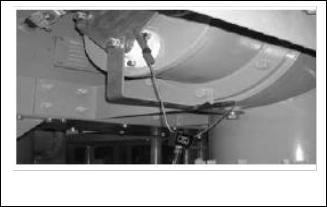
Some examples of UHF PD sensors in high-voltage equip- ments for laboratory tests and on-site PD are showed. Fig.1 shows UHF sensor to detect PD in GIS. This type of sensor has well been proven not only for laboratory test but also for on- site PD. The main advantage of the sensor has detection sensi- tivity very low as few apparent charges. Fig. 2 shows UHF sensor for PD detection in a cable joint, this type of sensor known direction coupler UHF sensor. The sensor has advan- tageously applicable for checking the right assembling work in power cable accessories. Fig. 3 shows UHF sensor for power transformer for usage DN 50/DN80 gate valve. The sensor can give alternative possibility to measure PD signal, this method known bushing-tap for galvanic connected decoupling. Fig.4 shows inductive UHF sensor for power cable termination. The sensor can give very low detection sensitivity as few PC
Fig. 4 Inductive UHF sensor for power cable termination [25].

While the cable is in normal operation, the constraint allowing sensitive measurements on plug-in cable connectors can be overcomed by using on-line UHF test technique. The principle of UHF diagnosing on plug-in cable termination is shown in Fig.5. The capacitive sensor (electric component) and inductive sensors (magnetic component) detected transient electromagnetic field emitted by PD. The capacitive sensor is cupper disc with diameter 2 cm. The inductive sensor is two winding coil. The pulses emitted by PD are pre-amplified, filtered and processed with a computer-based oscilloscope.
Fig. 1 UHF sensor adapted to a GIS grounding bar [25]
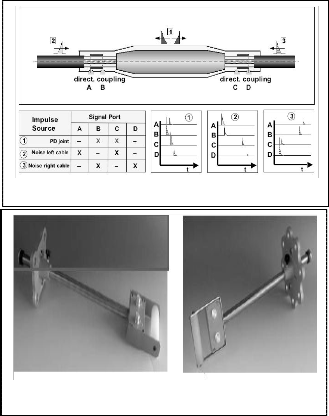
Fig.5 Plug-in cable termination and principle of the UHF PD Diagnostics [3]
Fig. 2 Directional coupler implemented in a cable joint [25]
The results of PD tests are not qualified due to SNR. This is major caused via limitation of measurement frequency less than 500 kHz. We can improve SNR by increasing the mea- surement frequency more than 500 kHz and by selecting either ultra wide band signal. When the signals travel inside the long power cable, it seems obvious that this technology works se- lectively due to strong attenuation of PD pulses within a high- frequency spectrum. Therefore, UHF technique is a perfect method to check accessories of power cable such as termina- tions and joints. The acceptance level of PD in power cable the apparent charge must be less than 10 pc.
Fig. 3 Oil valve sensor for power transformer reactor e.g. a) for usage on DN 50 gate valve b) for DN 80 gate valve [25]
IJSER © 2013 http://www.ijser.org
International Journal of Scientific & Engineering Research Volume 4, Issue 1, January-2013 3
ISSN 2229-5518
Fig.6 PD tests circuit acc non-conventional measurement me- thod. UHF PD sensor connected at high voltage-and-extra high voltage-termination [26].
Fig.7 Transmission coefficient tTEu of the TEM-modofor a di- electric spacer disc (thickness is 5 cm, Er = 6.5[31].
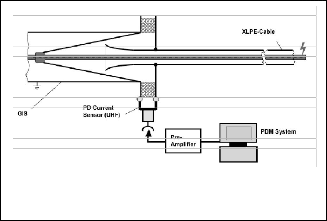
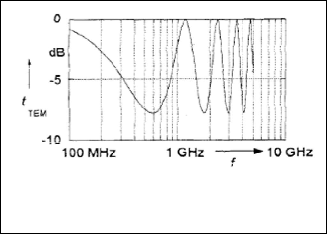
Figure 6 shows schematic diagram of the UHF PD measure- ment system in power cable. The system consists of UHF PD sensor, pre-amplifier and PD measurement. The UHF PD sen- sor is connected to GIS-cable termination and the output of this sensor is connected to high-pass filter by coaxial cable to limit range frequency within 300 MHz. It is also connected to a pre-amplifier to increase the SNR. The output of a pre- amplifier connected to PD measurement to PD pulse processing.
PD pulse current has short rise time less than a nanosecond (ns) in SF6 gas which is used used as insulating gas. The fre- quency component in UHF band is available in electromagnet- ic wave generated by PD signal. In the GIS tank, the electro- magnetic wave emitted by PD signal can propagate over long distance with very less attenuation so that UHF signals can be detected by using antenna or sensor. There is no influence of different noise arising from broadcast wave or telecommuni- cation signals with very high frequency. UHF method of PD signals has quick response, which detected SF6 decomposition species. In GIS, risk assessment of breakdown is easy to de- termine due to information on PD phenomena in SF6 gas [27]. There is another method to improve the accuracy of PD locali- zation and enhance the maintenance efficiency in GIS based on UHF combined with acoustic technique[28].
The main reason for attenuation of wave in GIS is power dis- sipation in metallic enclosure. Very low attenuation coefficient of 2dB/km is present with theoretical result values of about 1-
2dB/Km [29,30]. As an example we can take a flat disc to study the effect of a spacer in GIS. It can compute the reflec- tion lossless dielectric disc by using model of a transmission line. To compute transmission coefficient of Transversal Elec- tric Magnetic mode (TEM) is shown in Fig.7 and to compare a coefficient of Transversal Electric (TE), Transversal Magnet- ic(TM) mode in transmission line with cut-off frequency about
500MHz are shown in Fig.8. We can see transmission coeffi- cient approach zero for both TM and TE mode in some fre- quency band that showing for every mode available series frequencies are not attenuate.
Fig. 8 Transmission coefficients fTE and rmffor a dielectric spacer disc (thickness is 5 cm, E, = 6.5)[31].
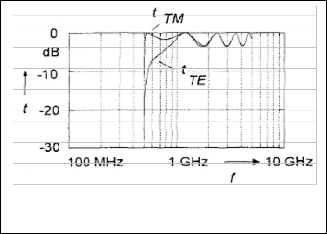
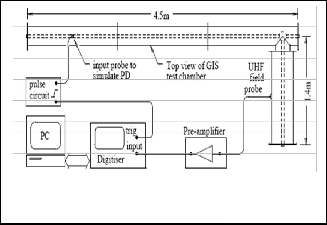
Fig. 9 shows typical measurement arrangements. The sys- tem consists of UHF field probe sensor, pre-amplifier, digitizer and personal computer. We can see the signal coming from a sensor; goes go to a pre-amplifier with 25dB gain and band- width 1GHz. The maximum record 20ns caught using digi- tizer, where in each arrangement the first UHF signal was col- lected via five recorded by the trigger delay (20ns in each step).
Fig.9 Measurement equipment and a typical GIS test cham- ber[32].
IJSER © 2013 http://www.ijser.org
International Journal of Scientific & Engineering Research Volume 4, Issue 1, January-2013 4
ISSN 2229-5518
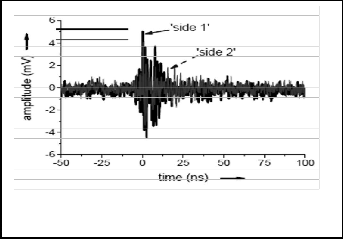
UHF PD detection in transformer has been widely used. Some of the advantages of using UHF technique in transfor- mer is low noise level due to shielding, low signal attenuation of oil insulation and sensitive measurement with noise on-site condition due to complete structures.
The laboratory set up of PD measurement in transformer consists of half closed metallic tank with dimensions (1.0 m,
0.5 m, 0.5 m ) with a needle sphere PD source, with two simi- lar disc – sensors. The bandwidth of transient record was 3
GHz and no additional amplification is used. Furthermore,
there is a metallic wall inside closed half tank to divide tank
into two sections, every section has one sensor as shown in the
Fig.(10,11). It is also called as “2-path-arrangement”. We can
analyze different types of structures and materials in the “2-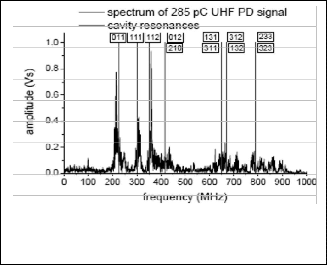
path-arrangements”. In oil-oil test the pulse energy attenua- tion was 4.27% -0.19 dB with apparent charge 1.8-3.7 pc. While in solid insulation materials the apparent charge is 2.7 pc. Fig.12 shows comparison between attenuated and unatte- nuated signals.
Fig. 12 UHF PD signals of a needle-sphere PD-source in oil up to
3GHz[3].
Figure 13 shows typical UHF monitoring system. The sys- tem consists of UHF sensor, amplifier, detector, data acquisi- tion and computer. The UHF sensor is inserted inside the tank of the transformer. The output signal of UHF sensor is con- nected to the amplifier which will be filtered and detected.
Finally, the signal data will be monitored and stored in a computer. Patterns of these data can be recognized by using intelligent software [33].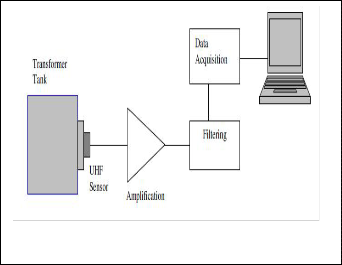
Fig. 10 UHF PD spectrum of a rod-plane PD source (apparent charge285 pc) with some dominant cavity resonances [3].
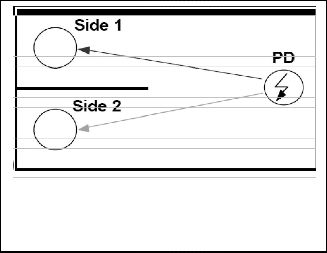
Fig.13 Principles of a typical UHF PD monitoring system[33].
Fig. 11 Schematics of the 2-path test setup: top view of the two sided experimental setup with half-closed test tank (1.0x0.5x0.5) m3, two disc-sensors and needle-sphere [3].
This article deals with UHF PD measurement in high- voltage equipment such as cable, GIS and transformer. UHF method of PD measurement can be used to perform diagnosis of insulation of the effective power apparatus. The laboratory experiment and on-line UHF measurements gave a low-noise level with a very high sensitivity. Due to this reasons, this me- thod of PD detection and measurement can be considered as future technique which will give a more precise PD values.
Acknowledgements
The author gratefully acknowledges the Faculty of Electrical
IJSER © 2013 http://www.ijser.org
International Journal of Scientific & Engineering Research Volume 4, Issue 1, January-2013 5
ISSN 2229-5518
Engineering, Universiti Teknologi Malaysia for giving the support in this work.
References
1. H. Firoozi, S.K., Experimental Attempts and Field Experi- ences to Fault Diagnosis of Power Transformers using FRA Technique. IREE International Review of Electrical Engineering, 2011. 6: p. 2221-2228.
2. Huecker T, G.J., HF partial discharge monitoring and expert
system diagnosis. IEEE Transactions on Power Delivery
1998. 13: p. 1162–1167.
3. Judd MD, C.G., Meijer S. Testing UFH partial discharge detection on a laboratory based power transformer. . In : proceeding of HIGH VOLTAGE ENGINEERING, Delft,
,The Netherlands., 2005.
4. Junhao Li, Q.H., Wenrong Si, Yanming Li Measure-ment and Mathematical Fitting of Partial Discharge Pulse Burst in Transformer Oils. IREE International Review of Electrical Engineering 2011. 6: p. 1181-1186.
5. Kato T, E.F., Development of UHF insulation diagnosis
system of GIS. Master dissertation, Dept. Elect. Eng., Tokushimat University, Japan 1999.
6. Kim KH, S.J., Yi SH. , Development of PD measurement technology for power transformer (2). . In : proceeding of ED&HVE, Ansan, Korea., 2005.
7. Kuppuswamy R, C.P., Condition assessment of large power transformers by on-site UHF partial discharge measurements. In : proceeding of HIGH VOLTAGE ENGINEERING, No. G-038, Beijing, China., 2005.
8. Markalous S, T.S., Fuser K. , Improvement of acoustic
detection and localization accuracy by sensitive electromagnetic PD measurements under oil in the UHF range. . In: proceeding of HIGH VOLTAGE ENGINEERING, No.G-047, Beijing, China., 2005. No.G-
9. Moranda H, S.M., Walczak K, Grzesiak HM Enlarge- ment of fingerprint in procedure of defects recognition in oil- paper insulation using time parameters of PD. In: proceeding of HIGH VOLTAGE ENGINEERING , No. G-056, Beijing, China., 2005. , No. G-056.
10. Odawara F, K.T., Ohtsuka S, Matsumoto S, Hikita M. ,
The influence of the tank material for detecting the partial discharge measurement using the UHF method in transformer oil. . In: proceeding of ED&HVE, PA-10, ,Ansan, Kore.,
2005.
11. Peng Y, L.J., Wang S, Li Y. , An UHF partial discharge on- line monitoring system for power transformer. In : proceeding of HIGH VOLTAGE ENGINEERING, No. G-036, Beijing, China., 2005.
12. R. Kurrer, K.F., The Application of Ultra-High-Frequency Partial Discharge Measurements to Gas-Insulated Substations. IEEE Transactions on Power Delivery 1998.
13. S. Tenbohlen, D.D.a.S.M.H., Partial Discharge
Measurement in the Ultra High Frequency (UHF) Range. IEEE Trans-actions on Dielectrics and Electrical Insulation 2008. 15: p. 1544 – 1552.
14. Markalous S, T.S., Fuser K. , Improvement of acoustic
detection and localization accuracy by sensitive electromagnetic PD measurements under oil in the UHF range
. In: proceeding of HIGH VOLTAGE ENGINEERING,
No.G-047, Beijing, China., 2005.
15. Peng Y, L.J., Wang S, Li Y. , An UHF partial discharge on- line monitoring system for power transformer. . In : proceeding of HIGH VOLTAGE ENGINEERING, Delft,
,The Netherlands., 2005. No. G-036, Beijing, China.
16. Kuppuswamy R, C.P., Condition assessment of large power transformers by on-site UHF partial discharge measurements. In : proceeding of HIGH VOLTAGE ENGINEERING,
2005. No. G-038, Beijing, China.
17. Odawara F, K.T., Ohtsuka S, Matsumoto S, Hikita M., The influence of the tank material for detecting the partial discharge measurement using the UHF method in transformer oil. In: proceeding of ED&HVE, PA-10, ,Ansan, Kore.,
2005.
18. Kim KH, S.J., Yi SH. , Development of PD measurement technology for power transformer (2). In : proceeding of ED&HVE, Ansan, Korea., 2005.
19. Judd MD, C.G., Meijer S. Testing UFH partial discharge detection on a laboratory based power transformer. In : proceeding of HIGH VOLTAGE ENGINEERING, Delft,
,The Netherlands., 2005. , Delft, ,The Netherlands.
20. Judd MD, C.G., Meijer S. Testing UFH partial discharge detection on a laboratory based power transformer. In : proceeding of HIGH VOLTAGE ENGINEERING, 2005. Delft, ,The Netherlands.
21. Judd MD, Y.L., Craddock IJ. , Locating partial discharges using UHF measurements: a study of signal propagation using the fine-difference time-domain method. . In : proceeding ofHIGH VOLTAGE ENGINEERING, , 2005. No. G- 019, , Beijing, China, .
22. D. Aschenbrenner, H.-G.K., W. R. Rutgers and P. van
den Aard-weg On line PD measurements and diagnosis on power trans-formers. IEEE Trans on Dielectrics and Electrical Insulation 2005. 12: p. 216-222.
23. W. Wang, C.R.L., Z. Tang, Z. Li, Y. Ding An on-line UHF PD monitoring system for power transformers. In: proceeding ELEC-TRICAL INSULATION, 2004. Cina: p.
50-53.
24. M. D. Judd, L.Y.a.I.B.B.H., Partial discharge monitoring for power transformers using UHF sensors Part 1: Sensors and Signal Interpretation. . IEEE Electr. Insul. Mag, 2005. 21: p. 5-14.
25. M. Wang, A.J.V.a.K.D.S., Review of condition monitoring
assessment of power transformers in service. IEEE Electrical
Insulation Magazine 2002. 18: p. 12-25
26. markalous, S., advances in PD measurements technique
:parallel synchronous detection time domain and frequency domain process for improve sensitivity. . In: proceeding of CONDITION MONITORING AND DAGONISS , Beijing
IJSER © 2013
International Journal of Scientific & Engineering Research Volume 4, Issue 1, January-2013 6
ISSN 2229-5518
,, 2008: p. pp1-8.
27. Bltze, M., on-line partial discharge monitoring and diagnosis of power cable In: proceeding of ELECTRICAL INSULATION, Montreal, QC., 2009.
28. Ohtsuka S, O.M., Teshima T, Kaneko S, Okabe S, Hikita M Influence of GIS tank size on first-incoming PD-indeced elec-tromagnetic wave in terms of risk assessment of GIS. . IEEJ Transactions on Power and Energy 2004. 124: p.
1365-1372.
29. Junhua Liu, C.H., Yong Qian, Xiuchen Jiang Analysis on Partial Discharge Localization U sing UHF Combined with Acoustic Method in GIS. . IREE International Review of Electrical Engineering 2010. 5: p. 1266-1270.
30. J. S. Pearson, e.a., Partial Discharge Diagnostics for Gas-
Insulated Substations. . IEEE Trans. On Diel. andEl. Ins,
1995. 2: p. 893-905.
31. R. Kurrer, K.F., I. Herbst Calculation of resonant frequen- cies in GIS for UHF partial discharge detection. , in In : proceeding of GASEOUS DIELECTRIC1994, Plenum Press: New York.
32. R. Kurrer, K.F., The Application of Ultra-High-Frequency Partial Discharge Measurements to Gas-Insulated Substations. . IEEE Transactions on Power Delivery 13: p.
777-782.
33. Judd, M.D., UHF Partial Discharge Monitoring for 132 kV GIS, . In : proceeding of HIGH VOLTAGE ENGINEERING, 1997,August. Monréal: p. 1-4.
34. Z. B. Shen, a.E.F.E.-S., Localization of Partial Discharges Using UHFSensors in Power Transformers, . IPOWER ENGINEERING SOCIETY GENERAL MEETING, 2006. Montreal, Que.
IJSER © 2013 http://www.ijser.org